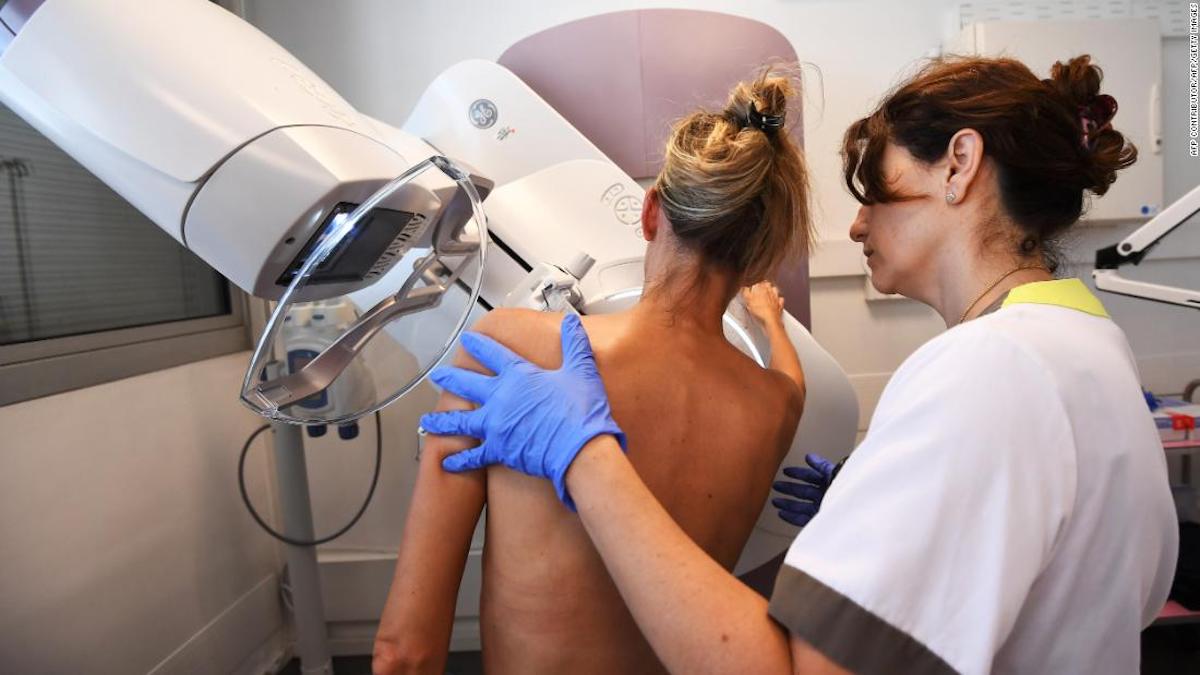(CNN) — When Dr. Devon Quasha found a lump in her left breast during a routine self-exam, the Boston primary care physician knew exactly what to do. He immediately scheduled a diagnostic mammogram and ultrasound at Massachusetts General Hospital for early January.
Later, Moderna’s vaccine became available to health professionals in the city. She received her first dose of the Covid-19 vaccine about a week before her scheduled mammogram.
Quasha didn’t notice much of a reaction to the vaccine at first, but a couple of days before her appointment, her left arm started to hurt.
Tender, swollen lumps developed under the left armpit, along with large swelling above the collarbone, all areas where there are lymph nodes, the body’s filters for germs.
“You have lymph nodes above and below your clavicle,” Quasha said. You don’t want to feel them. It was terrifying when I felt them.
Lymph nodes contain immune cells that help fight invaders. That’s why it made sense to Quasha for the nodes to react to the vaccine, creating antibodies, which is what they were supposed to do. But she couldn’t be sure.
The swelling was only on the left side where he had received the injection, the same side as the concerning lump. Was it a reaction to the vaccine or another sign of breast cancer?
“It was like a forest fire”
After the ultrasound, Quasha’s radiologist was concerned. She told Quasha that she considered the lump she had felt in her breast of little importance, but the lymph nodes that showed up as white spots on her mammogram were another matter.
In non-pandemic times, that finding would set off alarms, requiring the need for further investigation, including an immediate biopsy. However, Quasha had just received the vaccine. After speaking with her, Quasha said her doctor decided not to do a biopsy at that time. Instead, he told Quasha to come back for a follow-up ultrasound in six weeks.
This mammogram, taken after a patient received the COVID-19 vaccine, shows a swollen lymph node.
–
Similar situations had been happening in mammography centers across the country. As radiologists compared notes with their colleagues, word began to spread.
“We all started talking about it, and it was like a wildfire,” said Dr. Connie Lehman, chief of breast imaging in the Department of Radiology at Massachusetts General Hospital.
“I can’t tell you how many women show nodules on mammograms and many thought it would not be that common,” said Lehman, who is also a professor of radiology at Harvard Medical School.
Stories of unnecessary biopsies prompted the Breast Imaging Society (SBI) patient care committee to post a notice in January: Ask your patients about their covid-19 status and record the date and arm they received the vaccine. Consider that before automatically scheduling a biopsy.
“We wanted to make the case that women don’t always need a biopsy,” said Dr. Lars Grimm, associate professor of radiology at Duke University School of Medicine and one of the authors of the SBI advisory. “Because often the default of whether you see swollen lymph nodes in a patient would actually be recommending a biopsy.”
Lehman of Massachusetts General Hospital agreed. “When you hear hooves, don’t think of zebras,” he said. ‘If a woman has a vaccine on the arm on the same side and the lymph nodes are swollen, this is a normal biological response. It is fully expected. It just doesn’t make sense to start imaging.
That doesn’t mean that women who want to be certain about their cancer status can’t have a biopsy, Grimm stressed.
“In fact, there are some women who want to do a biopsy,” he said. “You can tell them, ‘Hey, I think this is because of your covid vaccine, and I’m sure it will resolve on its own in a few weeks and you’ll be fine.’ But maybe that patient tells you: ‘I’m not going to feel comfortable waiting, I want to know now.’
Focus on saving lives
For Quasha, the knowledge that many women were experiencing the same type of reaction to the vaccine was a relief from her concern. After a conversation with his doctor, he said that he no longer needs the follow-up exam.
“It put me at ease,” Quasha said. “The point here is that there are a number of side effects from the vaccine that are not dangerous, but can sometimes increase patient anxiety.”
Rather than bringing women back for an unnecessary ultrasound, radiology centers should focus on scheduling women who have missed a mammogram or are behind schedule, Lehman said.
“We need to address the large percentage of women who did not get screened due to the covid shutdowns,” he said. “Just in the [Hospital] Mass General, we were unable to screen 15,000 women due to covid, and we are still trying to get them re-entered.
“This is not where I need to start doing axillary ultrasounds, because someone had a vaccine and the node was swollen. It’s just not about being practical or pragmatic or putting the needs of our patients first, ”he said.
It’s not just breast cancer, Lehman emphasized. Lymph nodes in other parts of the body are also reacting to COVID-19 vaccines, making it possible for people with other forms of cancer to undergo unnecessary procedures.
“There have been some false scares and some unnecessary biopsies because people didn’t think to ask, and they assume that the node was the return of the cancer,” he said.
What to do?
To avoid unnecessary worry, the SBI recommends that women schedule any routine annual breast exams before receiving the Covid-19 vaccine. If a woman has already received the vaccine, or is scheduled to do so soon, the society suggests waiting at least four to six weeks after the second dose before scheduling her appointment.
At Massachusetts General Hospital, Lehman and his team have recommended one more step. They’re testing all women regardless of vaccine status, but they tell those with no history of cancer that swollen lymph nodes that could be connected to a COVID-19 vaccine are benign, that is, not cancerous.
“This follows the American College of Radiology recommendations that if you have a known inflammatory cause it can be said to be benign,” said Lehman, who recently published an article on hospital procedures.
“If your concern is post-vaccination swelling or tenderness in the armpit, we suggest that you wait four to six weeks, speak with your doctor, and if it persists, we ask that you come in for an evaluation,” she said.
Whatever you do, experts emphasize, don’t skip breast cancer screening when it’s recommended. A study published Tuesday in the journal Radiology, which followed more than half a million women, made the point clear: Women who skip even a scheduled mammogram before being diagnosed with breast cancer have a significantly higher risk of dying.
In fact, the risk of having fatal breast cancer within 10 years of diagnosis was 50% lower for women who underwent regular breast screenings, according to the study.
–


